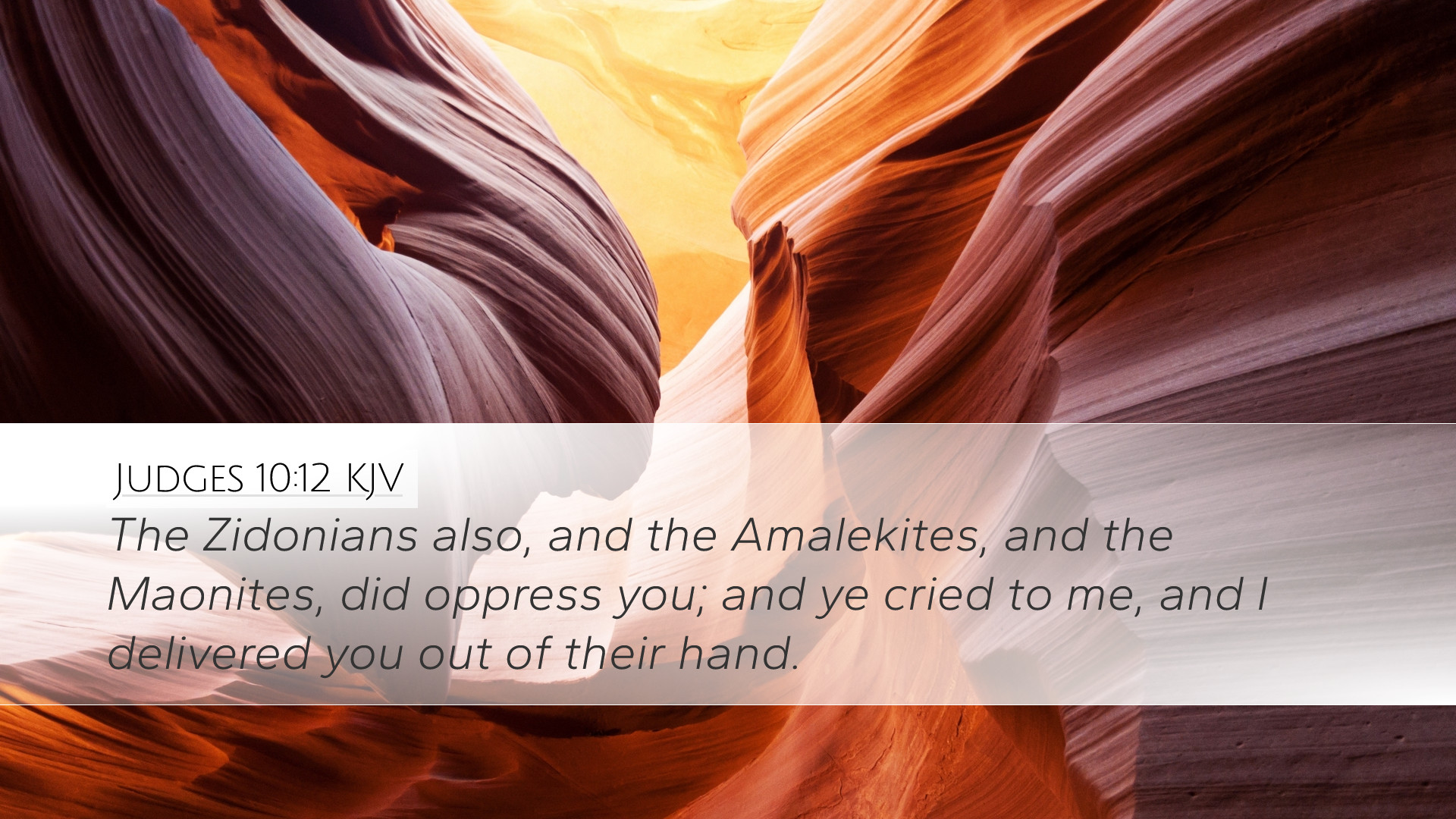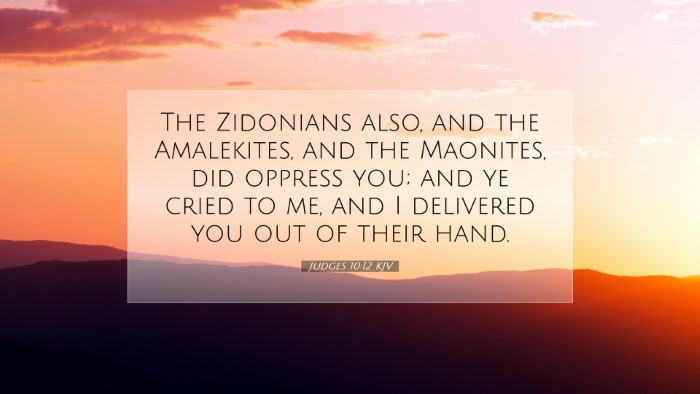Old Testament
Genesis Exodus Leviticus Numbers Deuteronomy Joshua Judges Ruth 1 Samuel 2 Samuel 1 Kings 2 Kings 1 Chronicles 2 Chronicles Ezra Nehemiah Esther Job Psalms Proverbs Ecclesiastes Song of Solomon Isaiah Jeremiah Lamentations Ezekiel Daniel Hosea Joel Amos Obadiah Jonah Micah Nahum Habakkuk Zephaniah Haggai Zechariah MalachiJudges 10:12
Judges 10:12 KJV
The Zidonians also, and the Amalekites, and the Maonites, did oppress you; and ye cried to me, and I delivered you out of their hand.
Judges 10:12 Bible Commentary
Bible Verse Commentary: Judges 10:12
Verse: "The Zidonians also, and the Amalekites, and the Maonites, did oppress you; and ye cried to me, and I delivered you out of their hand." - Judges 10:12 (KJV)
Introduction
Judges 10:12 provides a vital insight into the cyclical nature of Israel's disobedience and God’s deliverance. In the context of the Book of Judges, this verse highlights the prominent theme of divine mercy amidst human failure. The commentary unpacks the historical and theological implications present in this passage, drawing insights from various public domain sources.
Contextual Background
The Book of Judges narrates a historical period where Israel repeatedly turns away from God, leading to oppression by surrounding nations. This verse encapsulates one of the many instances of Israel's cry for help and God’s merciful response. The mention of different oppressors—in this case, the Zidonians, Amalekites, and Maonites—serves as a stark reminder of the multifaceted threats faced by Israelites.
Historical Significance
- Zidonians: A coastal Phoenician group known for their strength and naval prowess. Their oppression signifies the external dangers that Israel faced from the sea.
- Amalekites: Historically known as persistent foes of Israel, representing continual hostility towards God's people throughout their journey.
- Maonites: Mentioned less frequently in scripture, yet their inclusion emphasizes the multitude of adversaries that Israel encountered.
Theological Insights
This verse, like many in the Book of Judges, illustrates profound theological themes including:
- Human Fallibility: The repeated cycle of sin and repentance evident in Israel’s history underscores the pervasive nature of human sinfulness.
- Divine Mercy: God's readiness to respond to His people in their distress reveals His enduring faithfulness and mercy despite their unfaithfulness.
- Covenant Relationship: The reference to Israel crying out to God highlights the covenantal aspect of their relationship, where even in rebellion, a path to restoration through sincere repentance remains open.
Commentary from Key Theologians
Matthew Henry
Matthew Henry draws attention to the 'several nations that had done them mischief,’ highlighting the multitude of pressures that can besiege a community. He emphasizes that God's deliverance comes as a response to their acknowledged distress, revealing both God's mercy and the necessity of genuine repentance among the people.
Albert Barnes
Albert Barnes elaborates on the implications of Israel’s outcry. He explains that their motives—crying to God in their troubles—point to an awareness of their deep need for divine intervention. Barnes also emphasizes the significance of God’s willingness to deliver them despite their previous idolatry, showcasing God’s hesed (loving-kindness) towards His people.
Adam Clarke
Adam Clarke offers a critical historical lens, explaining the nature of the idols worshipped by the Israelites that led to their suffering. He notes the importance of the phrase “and I delivered you,” and suggests that this indicates a repeated action by God. Clarke calls attention to human accountability in the face of oppression, asserting that turning back to God is essential before true relief can be found.
Pastoral Applications
For pastors, this verse serves as a reminder of the importance of guiding congregations toward genuine repentance and reliance on God. The cycle depicted encourages leaders to foster environments wherein acknowledgment of sin and dependence on divine grace can be freely expressed.
Key Applications Include:
- Emphasizing Repentance: Encouraging congregants to confess sin and cry out to God as a pathway to spiritual renewal.
- Teaching about God’s Faithfulness: Assuring the people of God’s enduring mercy even amidst struggling faithfulness can bolster hope.
- Providing Biblical Counseling: Offering guidance on how to seek God's deliverance in personal and communal struggles can foster spiritual growth.
Conclusion
Judges 10:12 is not merely a historical account but rather a profound lesson in the nature of God’s interaction with His people. The verse encapsulates themes of oppression, repentance, and divine deliverance that resonate deeply within the Christian faith. Understanding these dynamics encourages believers and leaders alike to engage actively in their spiritual journeys while relying on God's unfailing promise of salvation and restoration.
As we reflect on this scripture, may we be reminded of the importance of remaining steadfast in our commitment to God, recognizing our need for Him, and trusting in His ability to rescue us from any oppression we might face.


